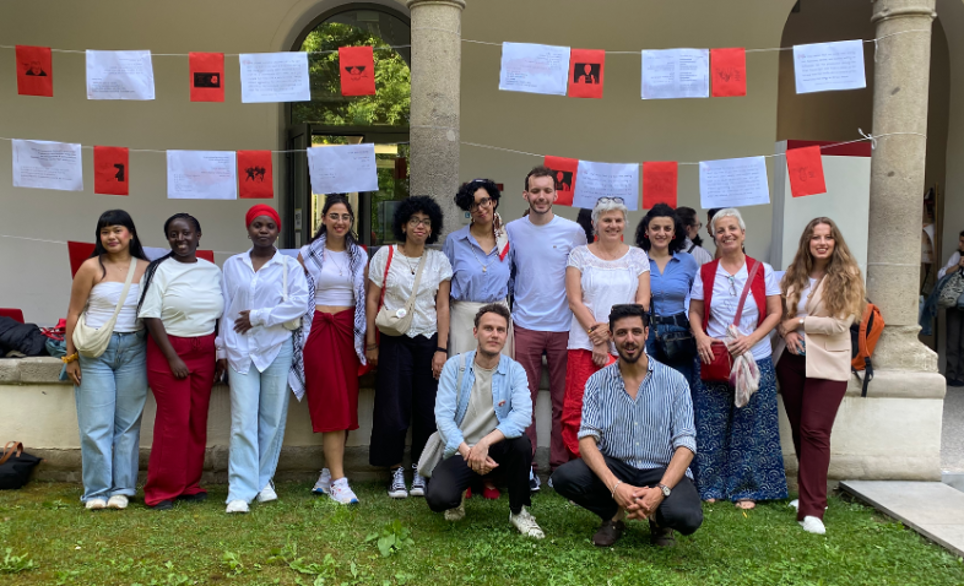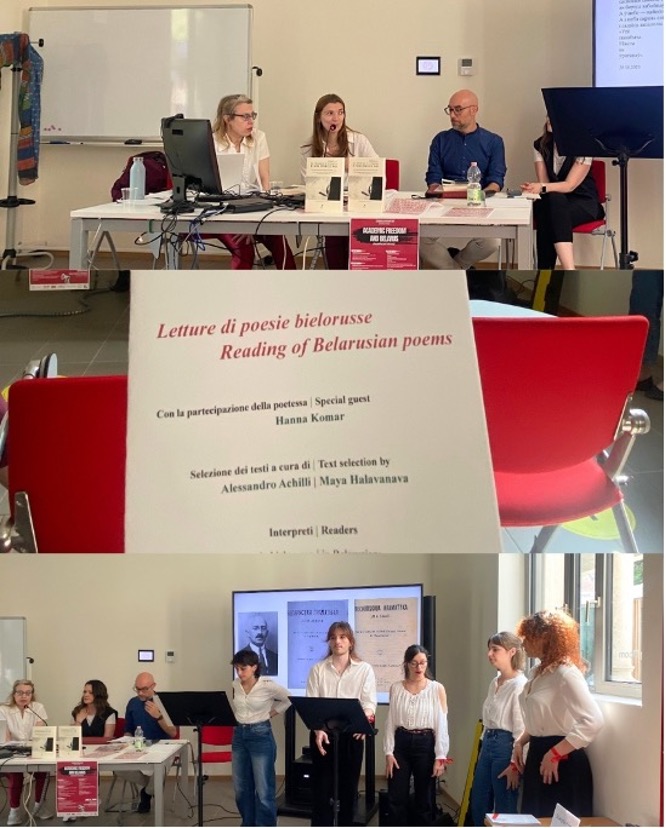Raising Voices: the 2025 Advocacy Day Report on Academic Freedom and Belarus

On June 5, 2025, the Scholars at Risk Student Seminar hosted its annual Advocacy Day at the Beato Pellegrino Complex. This year’s event brought together students, scholars, and activists to newly address the state of academic freedom, but with particular attention to Belarus. The programme combined personal storytelling, student-led advocacy projects, and contributions from different guests that shed light on the repression faced by Belarusian academics and the ongoing efforts to resist it.
Morning session
The morning began with institutional greetings from Professors Francesca Helm and Claudia Padovani (University of Padova, SPGI), Professor Viviana Nosilia (University of Padova, DISLL), Camilla Girasole from the International Relations Area, and councillor Francesca Benciolini of the Municipality of Padova. Their remarks emphasised the importance of defending academic freedom and the role of universities, and the value of student-driven advocacy in today’s political climate.
The first session, Intersections in Advocating for Academic Freedom, co-hosted by Scholars at Risk Italy and the Arqus Alliance, focused on how advocacy takes shape across institutions and media. Isolde Quadranti (University of Verona), Anna Maria de Salvo (University of Verona) and Fernanda Torre (Turin Polytechnic) shared best practice initiatives, including guidelines, training programmes for hosting at-risk scholars, and a series of webinars for SAR scholars. Furthermore, they introduced a new project: SAR on the Record, a podcast designed to amplify voices defending academic freedom worldwide. The three-themed podcast is scheduled to launch on Turin Polytechnic’s Spotify page in September 2025.
To answer the question “How many opportunities do our universities have to work on academic freedom and its values?” the Arqus project, presented by Mariam Kharpoutli, introduces a bottom-up initiative, based on Ilaria Berti’s master’s thesis on Belarusian academic freedom. The proposed communication strategy aims to use storytelling through the podcast and social media to disseminate information and consequently to broaden awareness. Their approach, rooted in student engagement and digital media, stressed the importance of translating academic freedom into everyday language that connects with audiences beyond academic contexts.
Following that, students from the SAR seminar, led by Professor Burcu Simsek (Hacettepe University), shared their storytelling activities. Developed through a digital workshop, these narratives focused on listening as a core component of advocacy. Using a story-circle method, the students created peer-based digital stories with the aim to foster connections and awareness.
The morning concluded with the session Can You Raise Your Voice? featuring the students’ advocacy projects. The first group presented Hear Her Out: Belarusian Stories from Behind the Bars, an account of the experiences of female political prisoners in Belarus. Their presentation included testimonies, petitions, and an interview with Alana Gebremariam, a former political prisoner and activist who spoke about her arrest, time in prison, and the role of student activism during the 2020 protests.
"If I could describe authoritarian regimes in three words, I would say: cruelty, power, and hatred " (Alana Gebremariam)
The second group focused on academic freedom, giving a sneak peek of their podcast interviews. They brought in Professor Paola Molino (University of Padova), who offered a historical perspective on the relationship between universities and power, and Maksim Zafranski (Belarusian Students’ Association), who discussed the role of students in international advocacy and how digital platforms can serve as powerful tools for mobilisation.

Aftenoon session
Afternoon session The afternoon session opened with The Unbroken Generation: Belarusian Students Against the Authoritarian Regime, organised in collaboration with Skaryna Press, a Belarusian publishing house based in London. The conversation began with the presentation of the book The Unbroken Generation: Youth Voices of Belarus 2020 by Ihar Ivanou, a collection of 25 student essays offering first-hand accounts of the 2020 protests, state violence, and forced exile. The book captures both the brutality of the regime and the resilience of young Belarusians, serving as a powerful testament to their peaceful struggle for democracy.
Ivanou then spoke about the broader role of the Belarusian diaspora in preserving cultural identity under repression. He noted how books have become more than cultural artefacts – they are anchors for the community. During the Soviet era, many Belarusian books were destroyed, but the diaspora ensured their survival. Today, books continue to serve as gathering points: places where people connect, exchange ideas, and imagine new futures. The session underscored that Belarusian culture, especially in exile, is not just surviving – it is evolving.
This was followed by an open dialogue with Zafranski and Gebremariam, who reflected on the ongoing struggles of those who fled Belarus after the 2020 crackdown. They spoke about the emotional weight of exile, the complexity of language politics, and the power of essays and literature to spark broader conversations beyond national boundaries.
The day concluded with a powerful literary session, Il mondo è finito. Noi invece no, a presentation of a new anthology of contemporary Belarusian poetry. Translators Alessandro Achilli and Maya Halavanava introduced the collection, with poet Hanna Komar joining for a live reading. Students from the DISLL department also participated, giving voice to poems that speak of loss, resilience, memory, and resistance. The closing session left a lasting emotional impression, which reminded everyone that poetry, like protest, can carry both grief and hope.

Attendance and engagement
The event drew participation both in-person and online. Throughout the day, approximately thirty people attended in person at the Beato Pellegrino Complex, with over 25 joining via Zoom. The hybrid format allowed for wide accessibility and international reach. Online engagement remained consistent across sessions, with participants actively contributing to the Zoom chat.
Student involvement was a core strength of the event. From presenting advocacy initiatives to leading storytelling sessions, students played an active role not just as participants but as organisers, moderators, and speakers. Their contributions helped foster a collaborative and participatory atmosphere throughout the day.
Outcomes and feedback
While formal evaluations are still being collected, the immediate responses from participants and collaborators were overwhelmingly positive. Several speakers and partners shared their reflections on the significance of the event and the role students played.
Maya Halavanava, co-editor of the poetry anthology Il mondo è finito. Noi invece no, wrote: “We were truly impressed by the commitment of the students who participated in the seminar and event. Their voices, their stories, their speeches, and their readings gave us not only very strong emotions but also great hope for the future. Thank you for this beautiful gift.”
Professor Viviana Nosilia (DISLL) stated: “It gives me great pleasure to take part in these initiatives, not only because of my civic commitment and fondness for students and colleagues in the area I am involved in, but also because I finally see an experience in which students do not have a ‘decorative’ role, as is often the case, but are protagonists.”
These reflections underline the event’s impact not only as a moment of advocacy but as a space where student voices were central, respected, and deeply moving.
Conclusion
Advocacy Day 2025 demonstrated the power of student engagement in defending academic freedom and bearing witness to global repression. Through storytelling, collaboration, and creative expression, participants contributed to a shared message: that solidarity and awareness remain vital tools in resisting censorship, silencing, and authoritarian pressure, both in Belarus and beyond.
On Saturday, June 21, 2025, Belarusian President Lukashenko released 14 political prisoners through a US-negotiated deal. Among them were opposition leader Siarhei Tsikhanouski and Dr. Natallia Dulina, a scholar on whose behalf students have been actively advocating for. However, more than 1,100 political prisoners still remain behind bars.
This partial release is a reminder that sustained advocacy can make a difference. Moments like these show that pressure, when organised, persistent, and principled, can truly bring real change. Advocacy day confirmed that even in the face of repression, voices raised in solidarity are powerful and necessary in the ongoing fight for freedom, dignity, and human rights.





